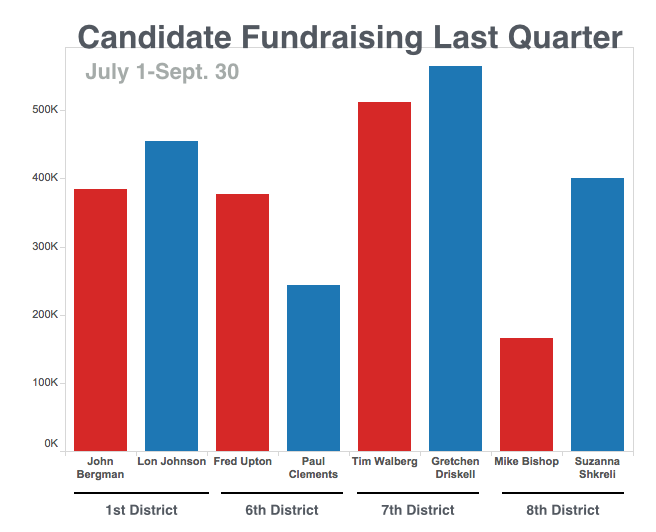Big Money in the Race for Michigan’s 7th Congressional District
Democratic State Representative Driskell challenges Republican Congressman Walberg in one of the state’s priciest races.

Over the last couple of months, you may have seen some of the campaign ads from Republican Congressman Tim Walberg:
And from the Democratic challenger in the 7th Congressional District, Gretchen Driskell:
According to the Michigan Campaign Finance Network, a non-partisan group that collects data on fundraising, residents living in the 7th District have seen more than $1.5 million dollars in TV commercials from the two candidates. Or to break it down another way, hundreds of ad buys. For example, a typical 30-second spot on Channel 7’s evening news cost the “Walberg for Congress” campaign $700 a pop.
The campaign for Walberg’s re-election declined to be interviewed for this story, but during an interview for WLNS in Jackson, the Congressman said rival ads that claim he supports the Trans-Pacific Partnership are wrong.
“So will you represent your constituencies like I did? Or will you posture on trade and not give us the chance to have 95% of the consumer base which is outside the United States.”
Congressman Tim Walberg
Regardless of the claims of the ads, Michigan Campaign Finance Network Executive Director Craig Mauger said both candidates have raised lots of money to run them. According to Mauger, the average cost of running a winning congressional race in 2014 was $1.6 million dollars.
“Both of these candidates have already raised more than two-million dollars with a few weeks to go before Election Day, so they’re going to raise even more. It just shows how expensive it is to run a congressional campaign in a competitive district like this one.”
Craig Mauger, Executive Director of the Michigan Campaign Finance Network
In fact, both candidates have raised over half a million dollars each in the last quarter alone, out-earning every other congressional candidate in Michigan during the same time frame. “If there’s going to be close races, donors want to give to try to sway the races,” Mauger said. “Gretchen Driskell and Tim Walberg have both been able to convince donors they have a chance to win and are thus giving to them.”

Walberg has the support of the U.S. Chamber of Commerce. Vice President of Political Affairs and Federation Relations Division Eileen Braden said that’s because Walberg stands with business owners.
“The Chamber is proud to support Tim Walberg who has earned a 90 percent voting record in supporting the interests of job creators and businesses both in his district but also across the country.”
Eileen Braden, Vice President of Political Affairs and Federation Relations Division for the U.S. Chamber of Commerce
Driskell, on the other hand, has the support of labor unions like the United Auto Workers and the American Federation of Teachers.
Michigan’s Seventh Congressional District has gone to Republicans in the vast majority of elections since the early 1990’s. The one exception was in 2008, when Democrat Mark Schauer won the seat for a single term. Schauer lost the district to current Congressman Tim Walberg in 2010 by less than five points. That’s a gap Gretchen Driskell said she can close.
“I think that people are really looking for somebody that listens to them, that wants to work hard, and will work together to solve problems. I’m hearing that over and over again. I really believe that our district and the people in our district, and I think our neighbors in general are starved for people who want to work together to solve the problems.”
State Representative Gretchen Driskell
Still, Driskell faces an uphill battle. With about $500,000 on hand, she has less than half of what Walberg has in his coffers. If the 7th leans Republican, as many political analysts contend, Driskell will need to make those funds count.
